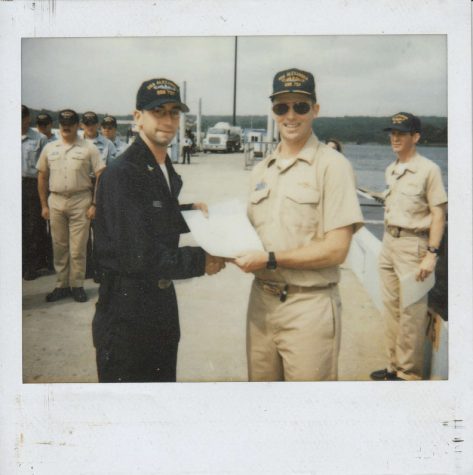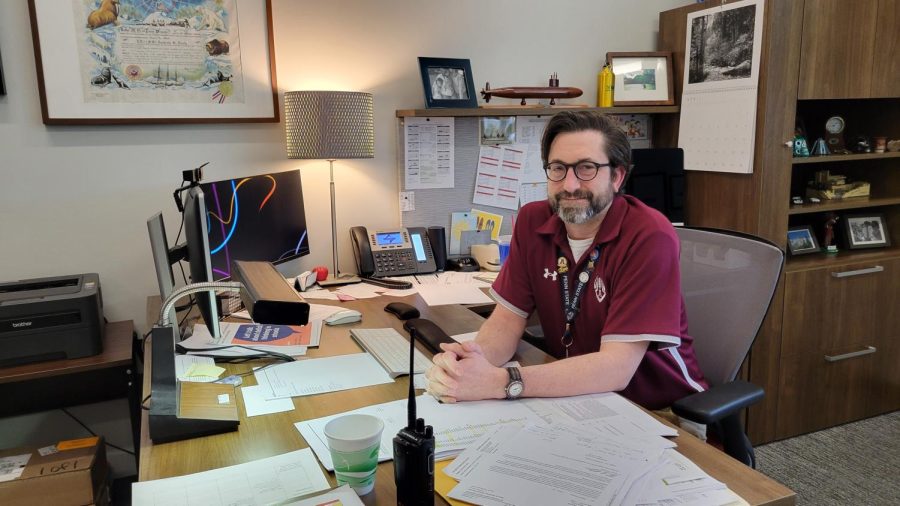Andrew Neely

Name
Andrew Neely
What was your highest rank?
When my enlistment was over, I achieved the rank of Petty Officer Second Class, which is E-5
Which branch were you in?
Navy
What rate did you have?
I was an Electronics Technician.
Why did you choose that branch?
I chose the navy for a couple reasons. One, at the time, I was interested in possibly pursuing a job with some sort of technology. The navy has a lot of different technologies that they employ for their missions. And I looked at it because I was fresh out of high school; I wanted an opportunity to travel. And if you pick the right field, the right rate, you can get the chance to travel a lot.
How long did you serve?
Five years, all five years were active.
How long ago did you serve?
I joined the summer after I graduated, so the summer of 1997, and my enlistment ended in July of 2002.
How did you end up becoming a teacher after serving? Was that your initial plan after serving or did it change?
When I first enlisted in the navy, I thought I was going to do something with technology and engineering. And after I spent some time in the navy, I started to reevaluate what I wanted to do when I got out. And one of my ‘collateral duties’ was the training Petty Officer, so I coordinated training for all the other people in my division aboard the sub. So it was kind of like being a teacher in a lot of ways, and I really enjoyed doing that. And I realized that maybe that was the direction that I wanted to go after my enlistment. That, and coupled with the fact that I had a couple educators in my family, it started to make sense. I just started to think about what type of education I wanted to get into, and I landed on English because I always really liked literature; I liked to read. I enjoyed the communication aspect of being an English teacher as well, teaching students how to be effective public speakers. Once that was all decided on, I used the G.I. bill to go to college, went to Penn State, got my four year degree and came out with a certification to teach English. My first job out of college was at my Alma Mater, which is Hollidaysburg, and I taught there for a number of years before getting into administration.
I always tell people that part of what led me to get into administration was all the different experiences I was able to have with different types of leaders when I was in the military. So I got to see approaches that different leaders would take. I had that in the back of my head, even while I was getting into education, that someday I would become an administrator.
Is there anything you remember about your time in the service?
All the time. Being that I went in when I was 18, those are some of your formative years, as far as when you’re making the transition from being a kid to being an adult. And the military has a way of forcing you to grow up pretty quickly because you’re doing really, really important things with really, really expensive equipment and with peoples lives on the line.
I’ll sometimes relate an experience that I have now with an experience I had in the military. I have very fond memories of being overseas and traveling to all these new, exciting places that I have been to before. And I have memories of when I was aboard [the submarine]. Lots of different memories, lots of different people. I always remember the people that I got to meet. I still stay in touch with a handful of them. It makes some pretty strong friendships in those environments
Where are some of the places you’ve been?
On my first deployment, we went to Scotland twice; I went to Norway. I’ve been all through the Caribbean, and I’ve sailed through the Bermuda triangle and came through unscathed. Florida, St. Croix. In my second big deployment, we went through the Straits of Gibraltar. We went to Italy for a little bit, we went to Crete, we went through the Suez Canal, then to the Persian Gulf, visited Bahrain, which is a middle eastern country, close to Iraq. I spent a lot of time there on that deployment; we did a lot of different exercises with various parts of the navy and foreign navies. Those are some of the big highlights of the countries I was able to visit.
What does being in the military mean to you?
Initially, I didn’t join out of any kind of huge sense of patriotism, although that came later. For me, it was all about getting out of central Pennsylvania and experiencing some things. When you experience it and you see all the sacrifices, you give up a lot of your freedoms, which sounds kind of weird, because you’re quite literally fighting for everyone’s freedom, but you yourself give it up because you’re told what to do. There is no, ‘I don’t want to do that,’ or, ‘no, I’m not going to do that.’ You signed on the dotted line, so you do it. To me, it’s a huge sacrifice that anyone that joins the Armed Services makes. We always, and rightfully so, memorialize folks through Memorial day and through Veterans day, folks that, specifically with Memorial Day, have given ‘the ultimate sacrifice,’ and died during combat. That’s certainly the biggest sacrifice that a family can make when they lose a loved one that is serving. But even when you retire or your enlistment is over and you’re out of the military, you still have sacrificed a lot. I remember friends who had families. They had a wife and kids, and they basically say goodbye for six months. They maybe get to make a phone call every once in a while. I have a very strong respect for anyone who signs on the dotted line to do that because you give up a lot. You get a lot back too, but you give up a lot, and not everyone is willing to do that. So if you’re willing to do it, my hat is off to you, and quite literally I salute you.
Any tips for students going into basic training?
The idea behind basic training is taking a civilian and transforming them into a military mindset. You give up some freedoms whenever you join the military. It is super important, regardless of which branch, or what you do in that branch, that you are able to follow instructions and follow orders. 90% of what boot camp, or basic training, is all about is breaking you of that mindset of, ‘I can kind of do what I want,’ to, ‘no, you need to do what those who are over you tell you to do.’ It really is, in a lot of cases, life or death. If you don’t follow the order, you can put peoples lives in danger. Basic training is probably 90% of a mental thing compared to the physical aspects of it. And certainly, there are lots of physical aspects: being able to run a certain distance in a certain amount of time, do so many push-ups and sit-ups. All of that is a big part of it, but the biggest part is the mental aspect. You may get asked to do something you think is totally ridiculous, like folding your t-shirt a certain way, and if it isn’t exactly that way, you get yelled at. But, what they’re actually doing is training you to pay attention to details, so you don’t mess it up. There’s a reason behind it, and if you go into it [basic training] thinking that way already, that transition will be a little bit easier. One way or another, you will learn the lesson before you’re done. But you may save yourself a little bit of aggravation if you go into it with that idea.
